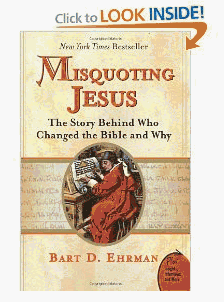
One has to give credit to Ehrman's skill as a writer. In his first 4 chapters, he made the art/science of textual criticism accessible to the lay reader by describing how accidental errors in text copying can occur and also how one might detect intentional changes to the text. In chapters 5-7, he described texts that he thinks were altered deliberately.
His chain of thought appears to be as follows:
(1) There are text variants in the NT manuscripts.
(2) Most people don't know there are variants.
(3) The variants are so numerous as to render the NT as worthless (or nearly so) as a source of knowledge about Jesus.
(4) If the general public knew about the variants, Christianity (as understood by most people) would collapse.
Claim one is beyond dispute. There are many thousands of ancient NT manuscripts (far more copies than any other ancient text) and within them are variants. The vast majority are little boo-boos as described by Ehrman in chapters 1-4 that are easily spotted and accounted for.
Claim two is true as the work of Biblical textual critics reside mostly in scholarly journals and not of interest or easily understood by the lay public. Ehrman has done a remarkable job in explaining the process to a lay audience and citing examples where there is dispute. However, in fairness to Bible translators, they do footnote Bibles to indicate where there is some question about the rendering of the text. The NIV is probably the most popular English Bible translation among US Christians and I checked some of the texts he cited and indeed the footnotes highlight briefly some issues Ehrman raised. Thus, there isn't a "conspiracy" to hide these variants.
Claim three is where sincere people will disagree. Ehrman dedicated his book to his thesis advisor Bruce Metzger who was probably one of the most noted textual critic scholars in the world was also very aware of the variants yet retained his faith while Ehrman did not. In fact, Metzger wrote this academic book to walk highly motivated (I'm not that motivated and I don't read Greek!) readers through the variants. Ben Witherington was also a student of Metzger (though older than Ehrman so their paths didn't cross in graduate school) who writes books for both the academic and lay audience retained his faith in Jesus with the same awareness of textual variants as Ehrman and Metzger. He posted his analysis of Ehrman's book at his blog.
Claim four rests on where one stands on claim three.
I think an important question is what do we expect of the Biblical text we have today?
If we think of the text as written by the finger of God and handed to humanity in one piece then we would be sorely disappointed.
However, God appears to have choose a path that involves human beings (I acknowledge that is a statement of faith). Thus, the texts of the Bible were written by humans under the guidance of God (I acknowledge that is a statement of faith) and then preserved by communities of faith. The preservation was not perfect but with the art/science of textual criticism, most variants (accidental or intentional) can be identified; thus, the Bible remains a reliable witness. Additionally, one has to acknowledge that the very survival of these communities of faith holding certain key beliefs about Jesus testifies to the enduring power of that faith and of the text these communities cling to.
Hope to post more on the challenge of Ehrman because his books are influencing the culture and need responses of both an academic and lay nature.
No comments:
Post a Comment